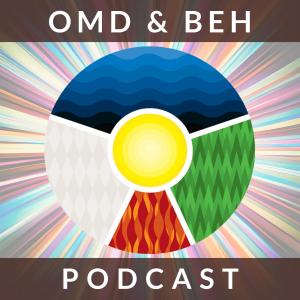OMD & BEH Podcast

Your Genes Are Not Your Destiny
BEH PODCAST EPISODE 55 - 8 Things Your Doctor is Not Telling You About Your Eye Disease, Part 7 of 8. Hint: Your Vision Can Improve. This is the seventh of eight talks that we are putting together about the eye work we do to help people who have chronic degenerative eye conditions, like macular and retinal dystrophies. Some of the specific names include macular degeneration, Stargardt’s disease, retinitis pigmentosa, and cone rod dystrophy. We also help people who have severe glaucoma and separated retinas. Our eyes need a lot of support to be able to heal itself because it can. Today, we will be talking about the genetics behind these diseases. Especially, the idea that your genes are not your destiny. Let me say it again, your genes are not your destiny. 8 Things Your Doctor is Not Telling You About Your Eye Disease, Part 7 of 8. Hint: Your Vision Can Improve. 055_OMDPodcast_8Things_Genes-Not-Your-Destiny-7of8CarlyleWelcome to the Organic MD podcast with Dr. Damon Miller. This is Carlyle Coash. How are you doing today, Dr. Miller?Dr. MillerI am doing pretty well during these tough times, by the grace of whatever. History will look back on this time, shake its head and wonder how we all got through it. I am grateful to be here because we are going to be talking about some important things. It is good to hear your voice, are you doing well?CarlyleI am holding up, as you said, by whoever is handing out grace. It seems to be helping to, at least, get through the day.Dr. MillerThis is the seventh of eight talks that we are putting together about the eye work we do to help people who have chronic degenerative eye conditions, like macular and retinal dystrophies. Some of the specific names include macular degeneration, Stargardt’s disease, retinitis pigmentosa, and cone rod dystrophy. We also help people who have severe glaucoma and separated retinas. Our eyes need a lot of support to be able to heal itself because it can. Today, we will be talking about the genetics behind these diseases. Especially, the idea that your genes are not your destiny. Let me say it again, your genes are not your destiny. Carlyle and I have been working with people for a couple decades now, and we see people in all different types of domains of their life. What we find of most people is they assume if it runs in their family; they will have and do the same thing their parents did. Your genes are not your destiny.CarlyleInstead of medical hexing, like we have talked about, we can say it is like a family or gene hexing. As opposed to seeing the pattern and looking to change it. Dr. MillerI see people respond to it if we can put it in some familiar ways. Without getting into a significant talk about genetics and epigenetics, consider the most common of these eye problems. Take the most common form of macular degeneration, called age related macular degeneration or ARMD. As it says in the name, the degeneration shows up in people when they are in their 60s, 70s, or 80s. From the time they are kids to the time they retire, there are no problems with their eyes. All of a sudden, their eyes start to fall apart. You need to be asking yourself if these diseases have a strong underpinning of some genetic predisposition, meaning you have a gene that predisposes you to the disease. We know that almost everybody who gets macular degeneration has some sort of abnormal gene. How is it that you can live to be 60, 70, or 80 years old, and have no idea that you have any kind of a genetic problem? You have had the gene from birth and your body has kept it suppressed. If it starts to rear its head, your body is able to fix things faster than they could break. This is true of many other diseases. Another bit of data that is interesting are the genetic testing kits, which look for genetic abnormalities. It is so common now, for only $90 you can get an at-home test kit that shows you any tendencies you may have for all these different dispositions.






 Visit Podcast Website
Visit Podcast Website RSS Podcast Feed
RSS Podcast Feed Subscribe
Subscribe
 Add to MyCast
Add to MyCast